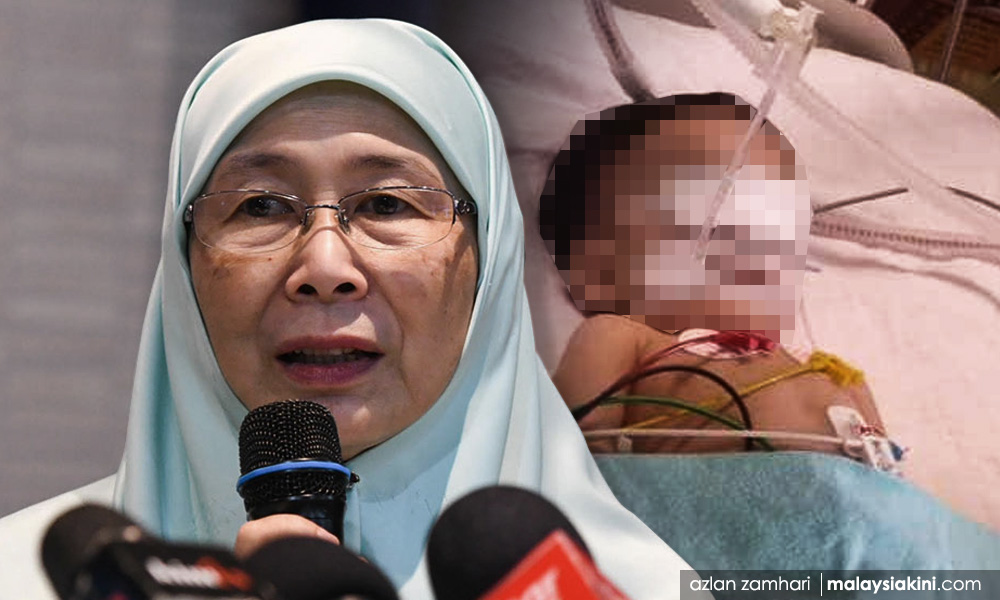
The implementation of the campaign on the use of gadgets and cyber smart family should be expanded as an effort to curb children from being exposed to pornographic materials and pornography on the internet, said Deputy Prime Minister Dr Wan Azizah Wan Ismail.
She said such a campaign could be carried out through government agencies in collaboration with non governmental organisations (NGO) to raise family and community awareness in controlling gadget usage and cyber surfing with restraint.
“A programme (campaign) like this should involve the cooperation of various parties in ensuring the future well-being of families in Malaysia,” she said when officiating the Sekeluarga Tolak Pornografi (SToP) or Whole Family Rejects Pornography seminar at the Institute of Teacher Education, Kent Campus,Tuaran today.
Also present were Deputy Chief Minister Christina Liew and state Assistant Finance Minister Kenny Chua.
Wan Azizah said the fifth Malaysian Population and Family Survey 2014 showed that the medium of communication among teenagers and their parents are through telephone (73.0 percent); short messaging system (54.6 percent) and social media (15.6 percent), revealing tha the use of gadgets among them was significant at present.
According to the same survey, 35.3 percent of youths, aged 13 to 24, are exposed to pornography and out of that total, 60.8 percent obtained the materials from the internet; smart phone (35 percent); and CD or DVD (20 percent).
Wan Azizah, who is also Women, Family and Community Development Minister, said uncontrolled use of gadgets could have negative implications on the users, especially children if it was misused and used without parental supervision.
She said the family played a role as an institution, among others, to provide protection, guidance and education to shape outstanding individuals besides becoming the backbone of the process in the establishment of a community and country.
The nation’s development should begin with the family institution in all aspects involving upholding religion, love, moral and good character and praiseworthy, she said.
However, Wan Azizah said the problem of fragility and collapse of family institutions was rising, contributing to such symptoms as child abuse; domestic violence; sex before marriage; and watching sexually obscene videos, which was a cause for concern.
Meanwhile she said statistics from the National Registration Department showed that 4,992 children were born out of wedlock to mothers, aged 18 and below, in 2017.
Up to June 2018, the number of children born out of wedlock to mothers, aged 18 and below, was 1,664, she said.
For cases of abandoned babies, Wan Azizah said 120 such cases was recorded in 2017.
“These figures showed that the role of the family must be strengthened and given added value so as to be able to control and curb their family members from falling prey to such negative activities,” she said.
Hence, Wan Azizah said the government had taken various initiatives to look into the importance of the family institutions and impairment of social issues with the introduction of the National Family Policy (DKN) which was enacted in 2010.
She said the policy, among others, emphasising on the family institutions was the right platform in human capital development towards achieving a development nation.
Wan Azizah said DKN would be empowered as a guide to all parties involved to bring the family perspective into the process of national development and policies in all all economic, physical environment, politics, spirituality as well as science and technology.
This is in line with the government's vision as contained in the Harapan Book through the 53 pledges, namely neighbourhood and family institutions as the basis of civilisation, she said.
On the seminar, Wan Azizah said the programme was held as an effort for everyone, especially NGO to assist the government in addressing social issues that were inhibiting human development and national progress.
- Bernama



No comments:
Post a Comment
Note: Only a member of this blog may post a comment.